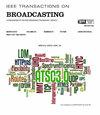安全视频质量评估抵御对抗性攻击
IF 4.8
1区 计算机科学
Q2 ENGINEERING, ELECTRICAL & ELECTRONIC
引用次数: 0
摘要
视频流量呈指数级增长,使得视频质量评估(VQA)变得更加迫切。利用尖端的架构,当前的VQA模型已经达到了与人类相当的精度。然而,最近的研究揭示了现有VQA模型在对抗对抗性攻击时的脆弱性。为了建立一个可靠实用的评估体系,迫切需要一种能够抵御此类恶意攻击的安全VQA模型。不幸的是,没有人尝试去探讨这个问题。本文首先尝试研究一般的对抗性防御原理,旨在赋予现有VQA模型以安全性。具体来说,我们首先在视频帧上引入随机空间网格采样来进行帧内防御。然后,我们通过守护图设计逐像素随机化,全局中和对抗性扰动。同时,我们从视频序列中提取时间信息作为帧间防御的补偿。在这些原则的基础上,我们从面向安全的角度提出了一个新的VQA框架,称为SecureVQA。广泛的实验表明,SecureVQA在安全性方面树立了新的基准,同时与最先进的模型相比,实现了具有竞争力的VQA性能。消融研究更深入地分析了SecureVQA的原理,展示了它们的泛化和对领先VQA模型安全性的贡献。代码可在https://github.com/GZHU-DVL/SecureVQA上获得。本文章由计算机程序翻译,如有差异,请以英文原文为准。
Secure Video Quality Assessment Resisting Adversarial Attacks
The exponential surge in video traffic has intensified the imperative for Video Quality Assessment (VQA). Leveraging cutting-edge architectures, current VQA models have achieved human-comparable accuracy. However, recent studies have revealed the vulnerability of existing VQA models against adversarial attacks. To establish a reliable and practical assessment system, a secure VQA model capable of resisting such malicious attacks is urgently demanded. Unfortunately, no attempt has been made to explore this issue. This paper first attempts to investigate general adversarial defense principles, aiming to endow existing VQA models with security. Specifically, we first introduce random spatial grid sampling on the video frame for intra-frame defense. Then, we design pixel-wise randomization through a guardian map, globally neutralizing adversarial perturbations. Meanwhile, we extract temporal information from the video sequence as compensation for inter-frame defense. Building upon these principles, we present a novel VQA framework from a security-oriented perspective, termed SecureVQA. Extensive experiments indicate that SecureVQA sets a new benchmark in security while achieving competitive VQA performance compared with state-of-the-art models. Ablation studies delve deeper into analyzing the principles of SecureVQA, demonstrating their generalization and contributions to the security of leading VQA models. The code is available at https://github.com/GZHU-DVL/SecureVQA .
求助全文
通过发布文献求助,成功后即可免费获取论文全文。
去求助
来源期刊

IEEE Transactions on Broadcasting
工程技术-电信学
CiteScore
9.40
自引率
31.10%
发文量
79
审稿时长
6-12 weeks
期刊介绍:
The Society’s Field of Interest is “Devices, equipment, techniques and systems related to broadcast technology, including the production, distribution, transmission, and propagation aspects.” In addition to this formal FOI statement, which is used to provide guidance to the Publications Committee in the selection of content, the AdCom has further resolved that “broadcast systems includes all aspects of transmission, propagation, and reception.”
 求助内容:
求助内容: 应助结果提醒方式:
应助结果提醒方式:


